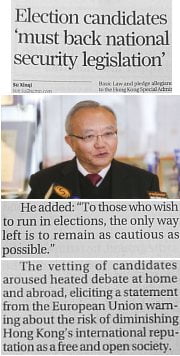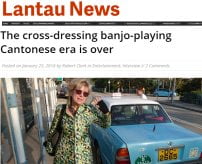Pro-Beijing sex-symbol Lau Siu-kai ponders the ideological tests Hong Kong has introduced out of nowhere in recent years to keep opposition activists off the ballot in elections. Yes, they are vague, he admits. Maybe you’ll be barred from running if you don’t support National Security laws. (So what the hell do you put in your platform if you want to win votes?) But maybe, he adds, it would be OK if you opposed them on grounds of timing. Who knows? Best not to have a position on anything, presumably.
The SCMP quotes the European Union as saying that this sort of thing damages Hong Kong’s reputation. We will be hearing more about this as Beijing continues to chip away at the city’s rule of law.
 The background…
The background…
So far, we have seen the twisting of process for political reasons. Examples include: the barring of candidates from the ballot for their supposed telepathically-inferred beliefs; the disqualification of lawmakers for incorrect oath-taking; and selective prosecutions of, and appeals for tougher sentences for, protestors.
Then there is the device of ‘interpretation’ of the Basic Law by the (rubber stamp) NPC standing committee, whereby Beijing can summarily change the apparent meaning of Hong Kong’s mini-constitution, with retroactive effect. The local judiciary now seems to accept these quasi-amendments without question, and Beijing can use this method to pre-empt the outcome of a court case (as it did with lawmakers’ disqualifications, and might do with some of the other politically-driven administrative decisions).
An even more draconian approach is a decision by the (‘highest organ of state power’) NPCSC, which is essentially an imperial edict overriding or bypassing even the Basic Law. Beijing recently resorted to this method to justify the transfer of high-speed rail terminus facilities to Mainland jurisdiction, and could use it to impose other decisions on Hong Kong as ‘national policy’ – anything it feels like (subject to implementation by rubber-stamp-to-be local legislature, hence above-mentioned disqualifications, etc).
All of this – especially the persecutions and exclusions of young photogenic opposition activists – has attracted international attention. The New York Times is the latest.
Which leads us to the interesting part…
Some members of Hong Kong’s legal and business community have recently noticed that a growing number of (particularly Western) companies are asking that Singapore rather than Hong Kong be named as the jurisdiction for contract enforcement and arbitration purposes. Especially where deals involve Mainland parties.
It seems that the Lion City’s officials are rubbing their hands with glee at Beijing’s attacks on Hong Kong’s rule of law (or at least surrounding press coverage). The scoundrels are dropping discreet but unsubtle hints that, to be safe, businesses should use the Lion City’s dependable, high-quality, oh-so classy British Common Law system, guaranteed unsullied by the Chinese Communist Party’s dirty fingers.
This is no doubt unfair. The infringements of Hong Kong’s legal principles are so far aimed only at what Beijing sees as threats to the CCP’s monopoly of power. More to the point, the Singaporeans are being massively hypocritical, given that their own legal system starts from a far inferior base in terms of human-rights protections, and Hong Kong business law more closely replicates UK legislation.
But what’s fairness got to do with it? Hong Kong is handing Singapore business promotion officials self-inflicted reputational damage on a plate – of course the city-state scumbags will bad-mouth their now-Communist-run rivals.
As Lau Siu-kai’s blather and the NYT’s reportage suggest, the decline of Hong Kong’s rule-of-law substance and image is just beginning. All Hong Kong’s government will be able to do is bleat more and more desperately and unconvincingly that all is well.
On the subject of decline: when a Hong Kong National Treasure calls it quits, it’s a bad sign…


C. Gamst-Berg is an old friend of mine. I am sorry to see her go, but not at all surprised.
Après elle, le déluge?
A quote from today’s ‘new IKEA look’ AliBaba People’s Daily: “…as it remains committed to telling the story of a rising China to the world.”
Ah so.
Singapore also adopts restrictive state immunity, as did Hong Kong until the Court of Final Appeal was forced to adopt China’s preferred model of absolute state immunity a few years ago. In theory, at least, this means that China can declare any SOE exempt from legal or arbitral awards in Hong Kong, but not in Singapore.
Just because it hasn’t happened yet doesn’t mean it won’t. There’s a first time for every extra-judicial kidnapping, every disqualification of a candidate for holding wrong ideas, every concession of territory to mainland authorities. Singapore might be starting from a lower base, but rule of law isn’t trending up in Hong Kong.
CGB, I truly loved her shows on the radio. Very entertaining. Too bad she is leaving.
We are stuck with Carry and her band of ugly uncles and aunties,
Oh, and the answer to your question is “Schadenfreude lah!”
This morning I saw banners of a Judy Chan (Regina Ip lite) fluttering in the icy winds of Causeway Bay. One thing struck my eye: the banners were promoted by both the New People’s Party (can you think of a more fascist name ?) AND the DAB.
At least Regina Broomhead, who studied democracy at Stanford under Professor Larry Diamond, is no longer pretending.